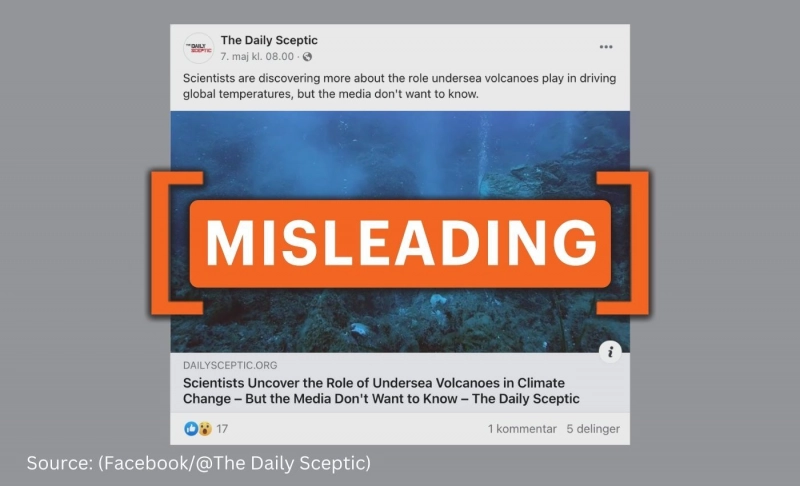By: Nikolaj Kristensen
May 11 2023
Mapping of the seabed does not prove underwater volcanoes to be the cause of human-made global warming

The Verdict Misleading
The Daily Sceptic article misrepresents research findings and climate models to suggest human-made global warming is caused by underwater volcanoes.
Context
A Daily Sceptic article claims that scientists have now discovered the role of underwater volcanoes in global warming, something, the article argues, largely ignored by scientists and media alike. According to the Daily Sceptic, these volcanoes could cause warming otherwise attributed to human-made activities, but climate models haven’t considered the effect. However, this is inaccurate.
In Fact
Climate models do, in fact, account for volcanic activity, focusing on emissions of CO2, sulfur, and ash. The fact that the volcanoes were previously undiscovered does not mean their effect on the climate could not be previously assessed. Also, the study the Daily Sceptic refers to did not evaluate the impact of underwater volcanoes on global warming.
Using radar data, a team of researchers did map more than 19,000 previously undiscovered underwater volcanoes, known as seamounts, and published the findings in Earth and Space Science in April 2023.
However, as the Daily Sceptic claims, the paper does not assess the effect of underwater volcanoes on global warming. Co-author of the paper David Sandwell, a professor of geophysics at Scripps Institution of Oceanography, disagrees with the central argument in the Daily Sceptic article that emissions from underwater volcanoes might be the cause of some (or all) of the warming otherwise considered human-made. “Most of these volcanoes are no longer active so they emit nothing,” he explains.
Logically Facts spoke to Marit-Solveig Seidenkrantz, a professor of geology and global climate change at Aarhus University, Denmark, who calls the Sceptic article an example of “alternative facts,” arguing that the article uses a study of basic processes in the Earth’s tectonic system to push its climate skeptic agenda.
The Daily Sceptic, Seidenkrantz explains, is wrong in postulating that climate models don’t account for volcanic activity. The models include the end-products – the CO2, sulfur, ash, and so on – coming from the volcanoes, and so, for the models to be precise, there is no need to distinguish between volcanoes above and below water or to count every volcano on the planet. And while volcanic activity might make short-term models imprecise, specific eruptions play an infinitesimally small role in the longer term, says Seidenkrantz.
She also points out the logical flaw of the Daily Sceptic article in suggesting that since more seamounts have now been discovered, they could somehow explain the rise in global temperatures over the past decades. “The referred study simply shows that there are more underwater volcanoes than previously thought – not that they are now becoming more numerous,” explains Seidenkrantz. “The amount of CO2 coming from man-made activity is about 60 times higher than that coming from volcanoes, so it would take a lot of volcanic activity for it to have a large impact on the atmosphere’s CO2 levels,” she says.
Volcanoes, in general, cause warming over thousands to millions of years as they emit greenhouse gases. In the shorter term of years and centuries, however, they cause cooling as eruptions blast sulfur and ash into the atmosphere, blocking sunlight.
The Verdict
The Daily Sceptic article suggests that newly discovered underwater volcanoes could explain global warming previously thought to be human-made and misrepresents study findings and climate models. The referenced study did not assess the effect of underwater volcanoes on global warming, and climate models do take volcanic activity into account. Therefore, we have marked this claim as misleading.


